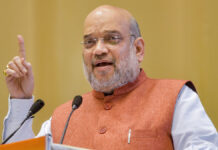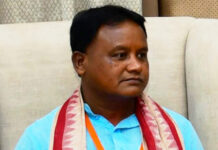Many have criticized chief minister Naveen Patnaik-led BJD’s decision to vote against the opposition’s no trust motion against the Modi government. But Patnaik took a considered decision which is in the interest of his party and the state. This has always been his policy. A votary of pragmatic politics the chief minister weighs the pros and cons of his every move before taking a decision. This time it was no different.
The Biju Janata Dal’s (BJD) decision to vote against Opposition’s no confidence motion against Modi government in the parliament has been criticized by many who feel that it goes against the regional party’s avowed policy of maintaining equidistance from both BJP and the Congress. However, the regional party had taken a considered decision keeping the current political scenario in the country in mind. It was a pragmatic decision on the part of BJD supremo and chief minister Naveen Patnaik.
Patnaik has always been a pragmatist in politics which is the reason he has been so successful winning five back to back elections and also becoming one of the longest serving chief ministers of the country. His decision was dictated by the peculiar needs of his party which despite being a regional outfit carries a lot of political weight at the national level.
This was perhaps the only step he could have taken with general elections drawing closer. Neutrality was also an option but not one that would yield political dividends for the BJD. Patnaik realizes more than anyone else that aligning with the opposition at this juncture would be like committing political hara-kiri. AS it is, the opposition, which recently floated a front called INDIA, has so far miserably failed to find a chink in the Prime Minister’s armour.
On the other hand, the NDA remains as strong as ever under Modi’s leadership and it would be utterly foolish to get into a situation which can lead to a confrontation with the government at the Centre. It is now common knowledge that Patnaik enjoys the best of relations with Prime Minister Narendra Modi. Both have carefully avoided attacking each other even at political rallies even though BJD and BJP happen to be rivals in Odisha. While their respect for each other continues to grow, both have been gaining from this burgeoning friendship. While Patnaik’s BJD has lent support to the NDA government on crucial issues like scrapping of article 370, Triple Talaq and the passage of Citizenship Amendment Bill in the Parliament, Patnaik has been receiving timely financial assistance from the Centre in the wake of natural disasters which remain permanent threat to the state’s economy.
For the NDA Patnaik-led BJD’s support in the Rajya Sabha is particularly important because it does not have the right numbers in the Upper House. But for Patnaik’s backing NDA might have found itself in a tight situation in the Rajya Sabha at critical times like the scrapping of article 370 and the passage of the controversial Citizenship Amendment Bill. In 2019, Patnaik had gone out of his way to help the BJP by getting present railway minister Ashwini Vaishnaw elected from Odisha to the Rajya Sabha. Responding to the Prime Minister’s request the chief minister saw to it that Vaishnaw was elected without any hitch with his party’s support even though BJP and BJD happen to be rivals in Odisha.
Though such moves may appear awkward and against BJD’s avowed policy of keeping equal distance from BJP and Congress, each decision of the chief minister has been well considered and in the interest of the state. He has also sided with the government at the Centre on issues involving national interest. That shows that Patnaik is no ordinary politician. He has been behaving like a statesman who can rise above narrow political interests and take a broader view of emerging political situations.
A regional chieftain Odisha chief minister is also keenly aware of the weight his party enjoys at the national level in the present political scenario where regional parties have emerged strong in several states. In fact, they are in a position to dictate terms to the government at the Centre. However, Patnaik has always chosen the path of cooperation instead of confrontation.
While he remains a votary of cooperative federalism he has studiously avoided becoming part of any political formation or alliance at the national level. Away from both NDA and UPA he has been charting his own independent course in politics. He has been receiving calls from senior opposition leaders to join their conclaves to discuss the possibility of stitching up an alliance ahead of the next elections but he has never been part of any such gathering.
A few months ago, West Bengal chief minister Mamata Bannerjee called on him in Bhubaneswar in an apparent bid to persuade him to join opposition’s efforts to form a united front against Modi. This was followed by a visit from Bihar chief minister Nitish Kumar who has taken the lead in bringing various opposition parties on a common platform in the hope of floating a united front to take on Modi. Patnaik cold-shouldered both the leaders.
While many political observers have sought to interpret his actions as pro-Modi in truth he has been taking each step after weighing its pros and cons and ensuring that his state benefits from it. Similarly, his policy of maintaining equal distance from the BJP and Congress should not be seen as a policy of splendid isolation which no chief minister in a federal country can afford to follow. It remains a flexible policy which gives him the freedom to decide his stand on different issues after taking into account the interests of his own state and the party.
There have been several instances of BJD backing the NDA government on crucial issues inside the parliament and also going with at the time of election of Ram Nath Kovind and DraupadiMurmu as the President of the country. Opposition parties like Congress have been critical of this attitude of Patnaik which they find “hypocritical” but the chief minister has his own justification for conducting his politics in a flexible manner.
The fact is that his party has always offered issue-based support to the NDA and opposed the government at the Centre where necessary. For example, Patnaik has been protesting against the construction of multi-purpose Polavaram project in neighbouring Andhra Pradesh as in its present form the project has the potential of inundating scores of tribal hamlets in Odisha’s Malkangiri district. Similarly, it was following sustained pressure from the chief minister that the government at the Centre formed a tribunal to decide the contentious issue of distribution of Mahanadi waters.
Patnaik has, thus, demonstrated that he can both oppose and support the government at the Centre depending on the issue involved. He charts an independent path in politics which suits him and his party. His stature at the national level has gone up and he is widely regarded as one of the best chief ministers of the country.





































